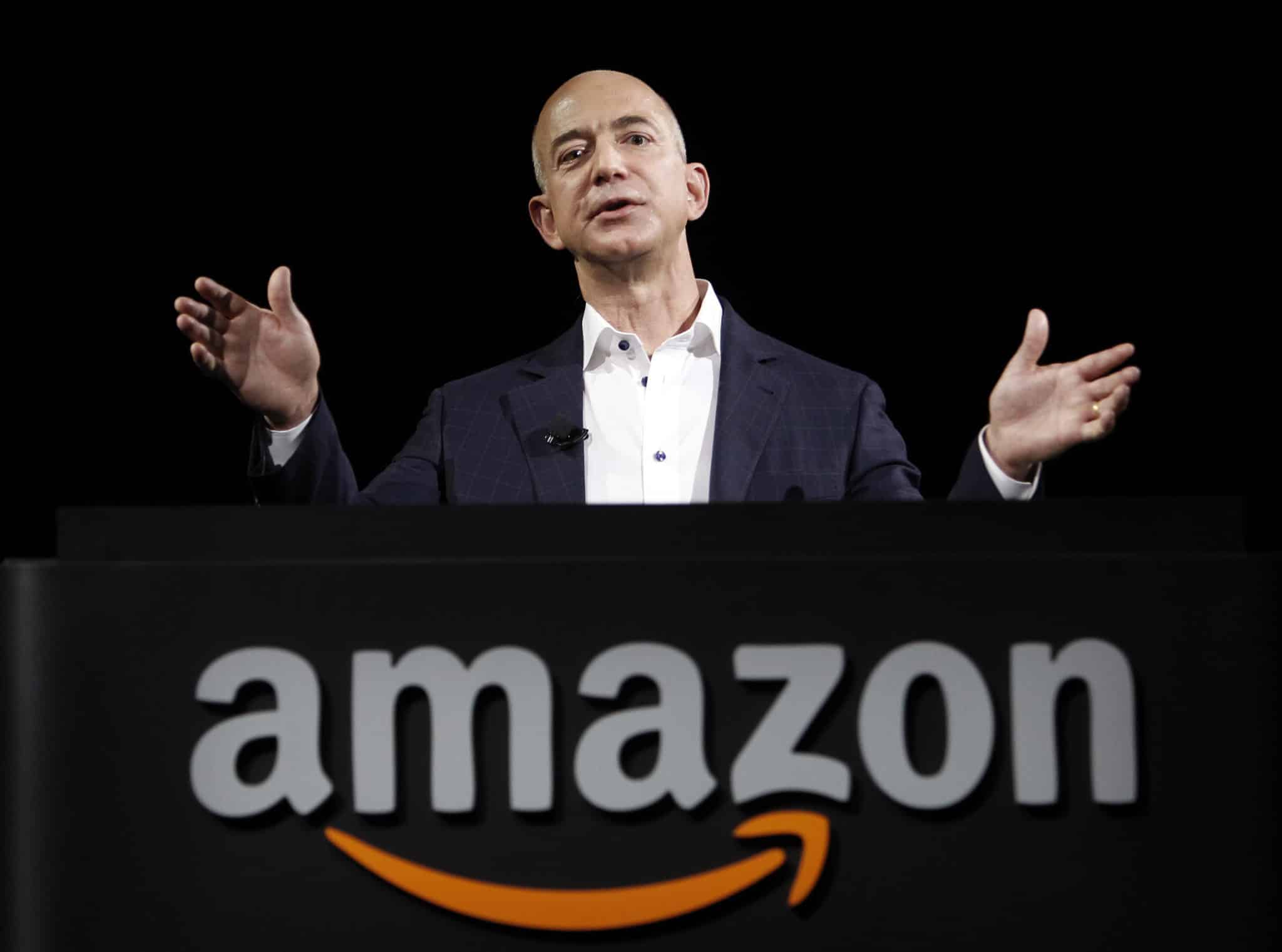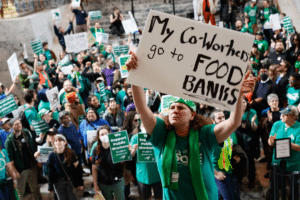Last month, Bloomberg reported that Amazon founder Jeff Bezos has amassed a fortune worth $150 billion. That is the largest amount in modern history, and mind-boggling however you look at it. Bezos is the only hecto-billionaire on the planet. He is worth two million times more than the average American family. He has about 50 percent more money than Bill Gates, twice as much as Mark Zuckerberg, 50 times as much as Oprah, and perhaps 100 times as much as President Trump. (But anyone knows!) Over the past year he got $50 billion richer. He would have to spend $28 million a day just to keep from accumulating more wealth.
As Annie Lowrie wrote in a recent feature on Bezos in The Atlantic, there’s no doubt that this historic fortune owes some part to Bezos’s ingenuity and business skills. She points out that Amazon has changed everything from the way we read, to how we shop, to how our postal system is structured. But she also argues that this incredible wealth is ultimately a policy failure, a sign of a tax system and a business and regulatory environment rigged to supercharge the earnings and wealth accumulation of the few. She asserts that Bezos didn’t single-handedly “earn” his $150 billion. In many ways, we gave it to him, perhaps to the detriment of all of us.
Bezos and Amazon are iconic exemplars of the triumph of capital over labor, like the Waltons and Walmart and Rockefeller and Standard Oil before them. The enormous gap between top-paid executives and employees in the U.S. is now so large, many find it shocking. Bezos has actually said there isn’t enough charitable need on earth for him to spend his billions on (unlike Gates or Zuckerberg, Bezos has only given away a tiny fraction of his fortune.) “The only way that I can see to deploy this much financial resource is by converting my Amazon winnings into space travel,” he said last April. “I am going to use my financial lottery winnings from Amazon to fund that.”
Many Amazon employees bristled at the remark:, half of the company’s employees earn less than $28,446 a year, according to the Amazon’s legal filings.* Some workers have complained of getting timed six-minute bathroom breaks. (Although Amazon insists it does not track or limit employee bathroom use.) Warehouse workers are required to pick goods and pack boxes at meticulously monitored speeds, handling up to 1,000 items and walking up to as 15 miles per shift. Contractors have consistently complained of wage-and-hour violations (including bringing multiple high-profile lawsuits against the company), and many say the company retaliates against whistleblowers.
The declining wealth of these blue collar workers, and the runaway fortune of their boss, are linked by policy. Consider taxes. The idea of America’s progressive income-tax system is that rich workers should pay higher tax rates than poor workers, with the top rate of 37 percent hitting earnings over $500,000. (The top marginal tax rate was 92 percent as recently as 1953.) But Bezos takes a paltry salary, in relative terms, given the number of shares he owns. That means his gains are subject to capital-gains taxes, which top out at just 20 percent; like Warren Buffett, it is possible he pays effective tax rates lower than his secretary does.
In addition, Amazon paid zero federal corporate income taxes last year, even though it made billions of dollars in profits. And it fought tenaciously against state and local taxes, and has successfully wrestled cities into pledging it billions and billions in write-offs and investment incentives in return for locating jobs there. (Considering that Bezos is the largest Amazon shareholder, that tax-dodging directly benefits him.)
Or take the low minimum wage here in the U.S., a policy that once again benefits corporations at the expense of common workers. Amazon’s entry-level wage is about $5-an-hour under the national living wage. The reason the company is so profitable and has such an astonishing pile of money to invest in operations and expansions is precisely because its labor force is so cheap.
Yet that arrangement is not cheap for taxpayers, who subsidize the effects of poverty wages with policies like the Earned Income Tax Credit, Medicaid, and the Supplemental Nutrition Assistance Program. One recent report showed that one in three Amazon employees in the state of Arizona receives food stamps.
Imposing non compete clauses to deny workers the right to move among employers is yet another way Amazon and other large companies are flexing their monopoly power—and keep in mind, they do this with Uncle Sam helping at the expense of workers. Amazon’s absolutely dominated in the realm of e-commerce, especially in markets like book-selling, giving it pricing power to squeeze both the companies it purchases goods from and its own employees. A recent study by The Economist revealed that when Amazon opens a fulfillment center in a community, it actually drives down warehouse wages: In counties without an Amazon center, warehouse workers earn an average of $45,000 a year, versus $41,000 a year in counties that do host an Amazon center. Research also show that in the two-and-a-half years after Amazon opens a new fulfillment center, local warehouse wages fall by 3 percent.
A final factor in the widening chasm between workers and the mega-wealthy is the decline of unions. Since it was founded nearly three decades ago, Amazon has repeatedly maneuvered to prevent the unionization of its workforce, an outcome that would bolster wages and improve working conditions. The company has shut down operations where workers were trying to organize, fired employees pushing for unionization, hired lawyers to push back against organizing drives at warehouses across the U.S., and provided managers with instructions on how to union-bust. (It has denied retaliating against workplaces seeking collective bargaining.) Meanwhile, the government and courts, have again sided against unions and in favor of business owners – time and time again.
When you add up al of these trends, it’s easy to see how income has steadily shifted upward, weakening worker power and supporting wealthy Americans higher up to turn simple earnings into self-perpetuating, ever-growing fortunes. “The period since 1973 has been characterized by falling purchasing power of the minimum wage,” said Mark Price, a labor economist at the Keystone Research Center. “It’s been characterized by a rapid decline in union density and by the falling top tax rate. It’s been characterized by no-poaching agreements among low-wage service employees.” As a result, he argues, it has been characterized by spiraling wealth and income inequality.
In the past few months, the Trump administration has tilted policy to amplify these decade-long trends instead of counteracting them. President Trump himself has pounced on Amazon for paying low postage rates, and called out Bezos for the Washington Post’s coverage of his administration. Yet at the very same time, the White House has continued to slash tax rates for corporations and the rich instead of middle-income workers, preserving loopholes and deductions for investment income. Now, the Trump administration is looking to give away another $100 billion to investors through a capital-gains tax cut. It has reduced companies’ regulatory burdens and appointed the most pro-business Supreme Court in history. It has failed to push for higher minimum wages, or stronger workplace protections.
The upshot of the past three decades of policy choices is that Jeff Bezos has accumulated a $150 billion fortune, while the average American family is poorer than it was when the Great Recession hit. Laments about our staggering levels of inequality are not just a matter of fairness, or “sour-grapes” in response to the runaway success of fellow-Americans. The point is not that Jeff Bezos himself has done wrong by amassing such wealth or creating such profitable businesses. But wealth concentration is bad for the economy and America itself, and the government has failed miserably to stop it. Rising inequality drives political polarization and partisan gridlock. It slows down economic growth, and imposes a lack of competition that fuels economic stagnation. It makes the government less responsive to the demands of ordinary Americans, eroding the foundations of our very democracy. Bezos’s astounding wealth reveal just how seriously the game is rigged. He just happened to play it better than anyone else.





